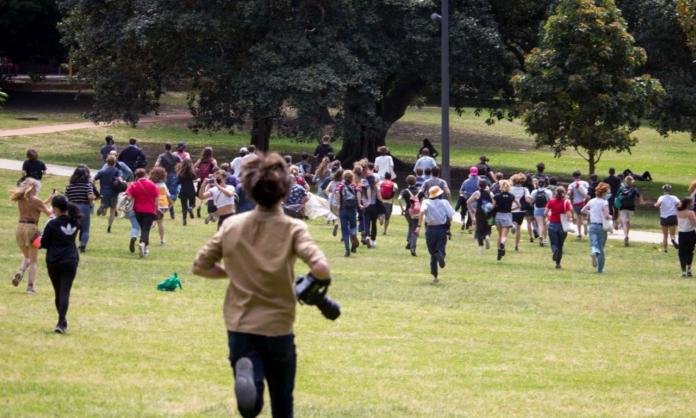Several hundred students have defied the ban on protests in New South Wales for the fourth time in two months. The Sydney University protest on 14 October brought together students from across the city, while also attracting a massive police mobilisation. In an effort to stop the event and intimidate attendees, riot police assaulted students, charged police horses into the crowd and imposed hefty fines on participants. Bystanders were not spared–Sydney University law professor Simon Rice, whose research includes laws relating to protests, was thrown to the ground by police, arrested and fined $1,000.
“People in Sydney, in large numbers and with a common purpose, go every day to a football match, the beach or a shopping centre without COVID-19 related police action,” Rice wrote afterwards in the Guardian. But “the same people cannot, it appears, go on a peaceful protest march without risking arrest”.
A video viewed over 50,000 times shows University of New South Wales Education Officer Shovan Bhattarai being shoved violently by a swarm of police. “They violently threw me into the gutter,” Bhattarai told Red Flag. “It was frightening. They treated other people similarly. The hypocrisy in using the COVID-19 measures is gob-smacking. New South Wales police obviously don’t want staff and students taking a stand against education cuts, but we’re not going to be intimidated by them.”
Riot cops also harassed student activists at both Macquarie University and at the University of New South Wales earlier in the day. One protester was fined before the rally began, after police identified him as having attended the previous weekend’s transgender rights rally. Police were also stationed on top of buildings at Sydney University to spy on activists. Earlier they had barricaded the quadrangle, where the protest was meant to start.
Despite these police-state tactics, students marched around the campus, the latest act of defiance against the anti-democratic actions of the New South Wales police and government. There is no sign of the police backing away from their repressive tactics, which means activists will have to remain firm on the need for civil disobedience.
The actions of the police have shocked many people, including some not particularly sympathetic to student protest. The University of Sydney’s management, for example, has felt compelled to put out a statement expressing concern over the treatment of protesters. With the passing of the “job-ready graduates” education bill in the Senate, and mass sackings of staff being rolled out at universities across the country, protest is only becoming more important. It can’t be suspended till some unspecified point in the future when it’s amenable to the police and Liberal government.
Students have vowed to hold more actions to keep the fight going both for accessible education and the right to protest.









